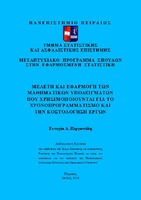Μελέτη και εφαρμογή των μαθηματικών υποδειγμάτων που χρησιμοποιούνται για το χρονοπρογραμματισμό και την κοστολόγηση έργων
Study and application of mathematical models used in project scheduling and costing

View/
Subject
Διαχείριση έργου ; Κατανομή (Οικονομική θεωρία) ; Στατιστική ανάλυση ; Οικονομετρικά υποδείγματαAbstract
This thesis explores the mathematical models developed by the Project Management discipline in order to insure that all ventures, small or large, treated as projects are completed on time and on budget. These models can either be deterministic or subject to stochasticity. In reviewing the stochastic nature of the activities constituting a project, the PERT method is analyzed. According to PERT, time uncertainty is incorporated in the conventional deterministic technique of the critical path, in order to determine the total project duration. Specifically, when activity duration is not estimated accurately, PERT uses two powerful formulas for the time mean and variance, which are based on the properties of the Beta distribution and the “three-point estimation” technique. However, the Beta distribution is not the only alternative for modeling activity time. Thus, the characteristics and properties of the Beta distribution families based on PERT and the Triangular distribution are explored, while at the same time their risk is compared in terms of standard deviation, so that the selected distribution fits best to the data. In addition, the Monte Carlo simulation is analyzed, a technique alternative to PERT, which manages to overcome most of the weaknesses of the latter, leading to more realistic and targeted results. Concerning the cost, the interest is focused on time- cost tradeoff, a project review technique, in which the stakeholders are willing to pay an extra amount of money in resources in order to complete the project as early as possible and at minimum direct cost. The stochastic component is now being considered as the uncertainty that rules the funding of the project. This stochasticity is applied to a construction project with real time and direct cost data, incorporating the "external" uncertainty of funding in the original time-cost tradeoff model, in order to examine whether project time acceleration as well as its implementation feasibility are affected.

